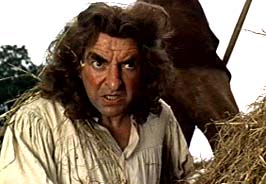 |
| Who wouldn't want to see him accept an Oscar dressed like this? |
Tom Jones is an adaptation of The History of Tom Jones, a Foundling, written by Henry Fielding and published in 1749. That might not sound like an enticing source for a movie, but Fielding was known for his humor and sarcasm; this period piece is actually a comedy. The story goes something like this: When Squire Allworthy (George Devine) returns home after many months in London, he finds an infant in his bed. Naturally curious, Allworthy investigates and concludes that one of his servants, Jenny Jones (Joyce Redman), and his barber (Jack MacGowran) made themselves a loud and leaky reminder of their lust. Being the mid-18th century, lust was seen as a bad thing, and Allworthy kicked both presumed parents out of his care. He chooses to raise the bastard as a gentleman and names the little fellow Tom Jones. Why Tom? Why not? It's not unusual. ***self-inflicted face-slap***
Fast-forward twenty-odd years, and Tom Jones (Albert Finney) has become a kind and fun-loving young man, with a warm spot for any comely lady who is willing to...er...keep him warm? Despite his many romantic entanglements, Tom is only seriously interested in Sophie Western (Susannah York). Too bad she's a lady and he's a bastard. Speaking of bastards, Squire Allworthy's nephew, Blifil (David Warner), hates the affection Tom seems to get from everyone, especially from the squire. He plots with a few lackeys to get Tom disinherited by Allworthy and forever banished from his land.
 |
| 200 years later, one of these men will be a Russian spy in Dr. Strangelove |
The acting in Tom Jones is generally pretty solid. Albert Finney is surprisingly charming as a young man. Since my knowledge of Finney comes from the past twenty years, it blew my mind that he ever spoke normally or had a facial texture that didn't resemble a prune. I don't know if I agree with Sophie's maid that he's "the handsomest man" she ever saw, but there are certainly less likely heartthrobs. Susannah York was pretty good, too, although a large portion of her role was to balance outrage with lovey-dovey eyes. Still, I thought she did well with the lead role. I really enjoyed Hugh Griffith as her father; he was a lot of fun as a boorish, crass, and insensitive squire.
 |
| Best line (to a grieving son at a funeral):"Eh, cheer up." |
 |
| "My fortune cookie says I will die by Biblical curse...?" |
Despite the presence of many, many recognizable actors and five Academy Award acting nominations, this film really isn't about the actors. It's about the direction. Tony Richardson took a fairly standard period piece and manipulated its style and tone to make something unique. The opening scenes are presented as a silent movie, complete with piano music and dialogue cards. There is a chase scene that is an obvious homage to Benny Hill. There are freeze frames and bizarre scene wipes. Richardson shows what is important in the story, not through dialogue, but by silence and ambient noise; Tom and Sophie fall in love during a dialogue-free extended montage (it had to be at least eight minutes long) and the hypocrisy of the "nobles" is shown through extreme close-ups of their savagery while they are hunting. There are even a few scenes where Tom breaks the fourth wall and addresses the audience; the best bit is when he is looking for his stolen money, accuses a maid/hotel owner, and then asks the audience if they saw her take anything from his pants.
Despite the interesting direction (and cinematography), I just wasn't terribly impressed by Tom Jones. While it certainly is a watchable movie, I expected more from one of the few comedic Best Picture Oscar winners. My biggest problem was the lack of funnies in the script. Granted, this film was made in 1963, so the misadventures of a horny guy might have been edgy and shamefully funny at the time, but --- wait, no. This film was released in the same year Dr. No was, and James Bond is at least as much of a man whore as Tom Jones. No, I'm afraid that Tom Jones is one of those movies whose humor wasn't that sharp to begin with and has only dulled over time.
There are also a few scenes that simply irritated me. I was grossed out by the extended eye-fucking Tom and Mrs. Waters engaged in over a forty-course meal. I don't know why, but watching people flirt with greasy food smeared on their faces makes me nauseous. The other scene I had a problem with was when Sophie's aunt advises a potential suitor to rape Sophie --- in those words! Maybe this was just a bone Tony Richardson wanted to throw to the oh-so-important sexual predator audience, but I felt that it was in poor taste; the character who obliges in the rape attempt isn't even important, so he could have been cut from the film entirely and whittled this film down to under two hours long.
Without any lasting humor (maybe it just wasn't slapstick or sarcastic enough for me?), the clever direction appears to be random at times. Without a sense of purpose, these solid acting performances lose their impact. All in all, this was an interesting step forward in style for mainstream filmmaking, but that doesn't make it fun to watch in the present.
 |
| Don't poke her eye out! |



